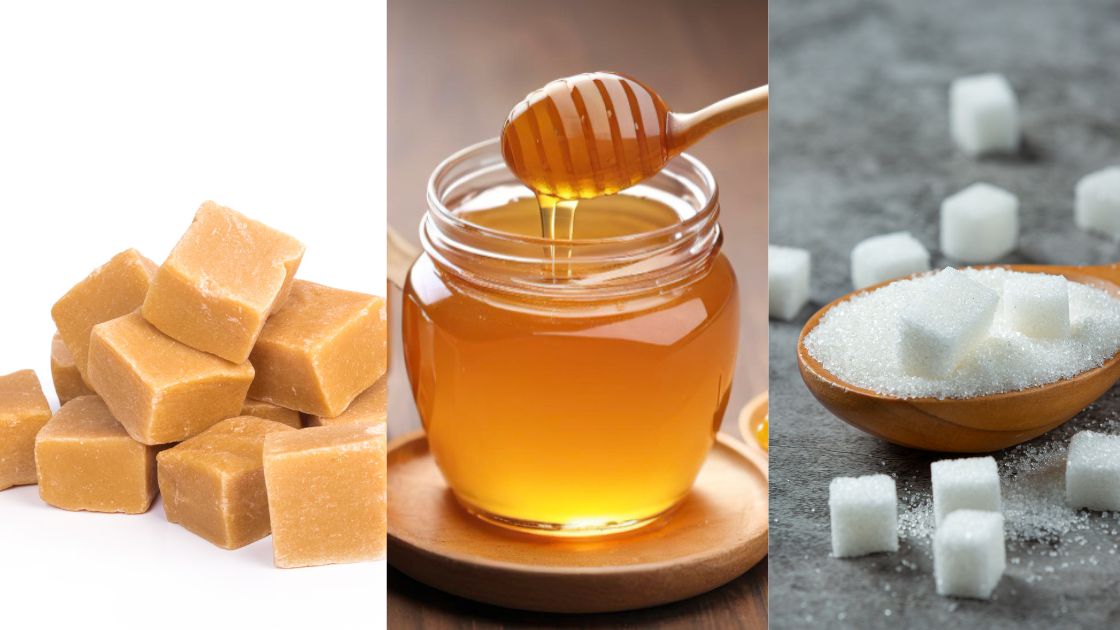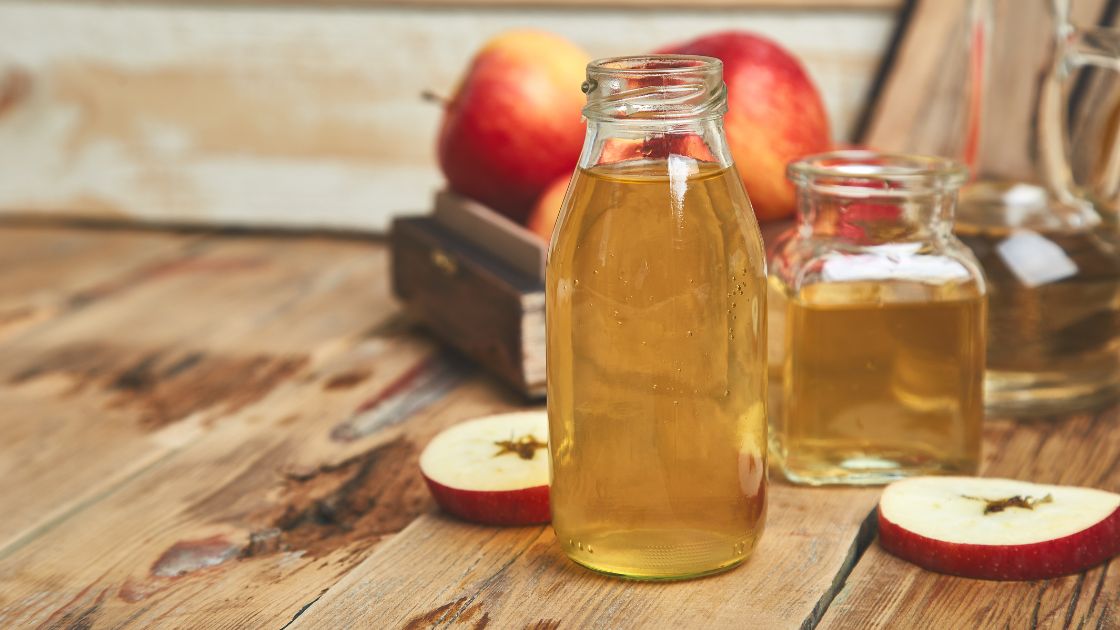
Jaggery Vs Sugar Vs Honey: Which Is Healthier Sweetener Choice?
Since most of us kickstart our mornings with a cup of coffee, tea, or a smoothie, what is used to sweeten them has sparked discussion and perplexed many health-conscious individuals. Sugar, in nearly all forms, is today viewed as a villain in terms of health and nutrition. As a result, with so many different sweeteners available — jaggery vs sugar vs honey — have you ever pondered which one is healthier for you?
Before you choose one over the others, keep in mind that the calories from all types of sugar are almost the same, with the only difference (although little) being their nutritional content and processing techniques.
It isn't just us; experts agree. Read on to find the various parameters that differentiate between jaggery vs sugar vs honey.
Comparison Between Jaggery vs Sugar vs Honey
|
Criteria |
Jaggery |
Sugar |
Honey |
|
Source |
Extracted from sugarcane |
Extracted from sugarcane or beets |
Produced by bees from flower nectar |
|
Taste |
Rich, caramel-like flavour |
Sweet with no distinct flavour |
Sweet with floral undertones |
|
Nutritional Value |
Contains iron, magnesium, potassium, and antioxidants |
Purely provides calories, lacks micronutrients |
Contains trace vitamins, minerals, and antioxidants |
|
Glycemic Index |
Generally lower than sugar |
It has a high glycemic index |
Variable, but usually lower than sugar |
|
Digestibility |
Digested slowly |
Quickly digested |
Easily digestible |
|
Health Benefits |
Help regulate blood sugar |
Provides low calories |
It may help soothe sore throats |
Understanding Honey & It's Importance
What is Honey?
Honey, a golden elixir created by bees from blossom nectar, has been valued throughout history for its sweetness and therapeutic benefits. Its trip from the hive to your table requires complicated bee-powered procedures, followed by extraction and little processing to preserve its natural nutrients and antioxidants.
Nutritional profile of Honey
Honey is much more than just a sweetener. It is high in antioxidants, vitamins and minerals. Despite its sweetness, honey has a lower glycemic index than refined sugar, making it a possibly better choice for blood sugar control.
Health Benefits of Honey
Honey is well-known for its antioxidant capabilities, which help to improve general health and lower the risk of chronic illnesses. It has antibacterial qualities that help heal wounds and soothe sore throats. Honey also serves as a prebiotic, which promotes gut health and digestion.
Do check our range of Pure Honey Products:
Understanding Jaggery & It's Importance

What is Jaggery?
Jaggery is a traditional, unprocessed sweetener derived primarily from sugarcane juice. This sweetener is strongly established in Asian and African culinary traditions, where it is valued not only for its sweetness but also for its nutritional content.
Nutritional insights into Jaggery
Jaggery contains minerals such as potassium, magnesium, iron, and manganese. It has a limited amount of vitamins and is believed to have a somewhat superior nutritious profile than refined sugar due to its low processing, which preserves more minerals.
Jaggery's contribution to health
Jaggery has several health advantages, including cleaning the body, improving digestion, and generating energy. Its high mineral content, particularly iron, makes it helpful in avoiding anaemia. Traditional medicine also praises jaggery for its cleansing effects.
Overview of Sugar
What is Sugar?
Sugar consists of glucose and fructose, which combine to form sucrose. It contains no extra vitamins or minerals. Sugar is a calorie-dense carbohydrate derived from sugar beetroot and sugar cane plants. It travels through numerous processing processes before becoming the refined, granulated table sugar that we most commonly consume.
Nutritional profile of Sugar
A teaspoon of table sugar contains around 16 calories (simple carbohydrates) and no additional micronutrients (minerals or vitamins). For this reason, calories from table sugar are often known as empty calories (calories with no additional micronutrient value).
Advantages of Sugar consumption
Sugar, being a carbohydrate, has the ability to offer fast energy. To operate effectively, your brain requires 130 grammes of glucose every day. This naturally occurring molecule has a comparable low-calorie content, with just around 16 calories per tablespoon. White sugar is long-lasting and easy to use in baking and cooking. Sugar is usually affordable and readily available.
Why Should you Avoid Refined Sugar?
Refined sugar contains empty calories, which can cause weight gain and raise the risk of a variety of lifestyle conditions, including diabetes and obesity. On the other hand, honey is high in antioxidants, and a reasonable amount of honey, particularly iron-rich honey, can make a significant impact and serve as an excellent substitute for refined sugar.
Honey Vs Jaggery
They both have the same number of calories. However, honey is superior to jaggery due to its low glycemic index and high nutritious content. In addition, jaggery contains minerals such as magnesium, copper, and iron, whereas honey contains antioxidants, vitamins B and C, and potassium.
Jaggery Vs Sugar Vs Honey: Which One is Better?

So, between jaggery vs sugar vs honey, which is beneficial? Honey can be used as a replacement for sugar in drinks. Jaggery can replace sugar in sweets and desserts. But what difference does it make to replace sugar with these?
First, why is sugar harmful? Sugar is unnatural and highly processed, but honey and jaggery are natural and semi- or unprocessed. Sugar's high-calorie content leads us to seek alternatives. However, on a 100-gram scale, practically all three types of sweeteners contain the same number of calories.
The difference is nearly minimal when we talk about a teaspoon of each. Furthermore, honey and jaggery include those added beneficial characteristics in relatively modest levels, making the content even lower when ingested in little quantities. To maximise the advantages, they must be ingested in substantial quantities, which contradicts our efforts to cut calories.
As a result, any sweetener, whatever it is, should always be used in moderation to maintain good health. No one chemical can be a healthier alternative to another. Reducing consumption is always a healthy decision.
Conclusion
The flavours and textures of these three regularly used sweeteners are very distinct. You may prefer the softness of honey on your morning toast to the molasses taste and wetness of brown sugar in baking. Experiment with each, keeping track of how much you use to see which is best for you.
Although honey has a better reputation, all three honey, jaggery, and sugar may be dangerous to your health if ingested in large quantities.
Consume all additional sugars in moderation. If you have diabetes or heart disease or are concerned about losing weight, see a doctor or a nutritionist about your dietary needs. They may work with you to develop the best nutritional approach for you.
FAQs
Q1. Which is healthier, jaggery or sugar?
Jaggery is healthier than white sugar because it maintains some of the minerals in sugarcane juice, such as iron, magnesium, and antioxidants. Sugar is more refined and devoid of nutrition.
Q.2 How does the sweetness compare?
Honey is the sweetest of the three, with white sugar coming in second. Jaggery has a somewhat lower sweetness level than sugar.
Q.3 Are there any specific uses for each?
Sugar is utilised in a variety of culinary and baking applications. Jaggery is a popular ingredient in Indian cuisine and beverages. Honey is a sweetener in various meals and beverages, and it has therapeutic properties.
Q.4 Which one is vegan?
Both jaggery and white sugar are vegan since they include no animal-derived components. Honey is not considered vegan since honeybees create it.
Q.5 Which one has a lower glycemic index?
Jaggery has a lower glycaemic index than white sugar, resulting in a slower rise in blood sugar levels after ingestion. Honey has a lower glycemic index than ordinary sugar.




